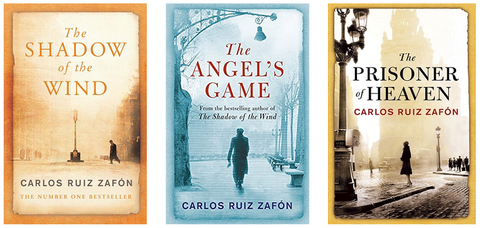
Fiddlehead readers who have been to Barcelona will have picked up the Carlos Ruiz Zafon trilogy of novels that begins with The Shadow of the Wind and is followed by The Angels Game and The Prisoner of Heaven (the last two not as good as the first, to my mind). The three books mostly feature the Barrio Gótico, but for my wife and myself following The Shadow’s events in the buildings around Avenida Tibidabo with its grand houses bought back most memories. We lived not far from there on the other side of Plaza Lesseps, a bit lower down the hill that leads to the pinnacle of Tibidabo and the amusement park ― on the side heading up to Pedralbes, in Calle Zaragoza, now Carrer de Saragossa in the Catalan. My story, “The Accidental Separatist,” is set in Pedralbes, in a grand old building that houses a fictional American Academy of Barcelona. It is a “simulacrum” of an actual mansion, which was converted to The American School of Barcelona, where my wife taught Grade 1, and I sometimes subbed. My regular stint was at the University of Barcelona’s Escuela de Idiomas, in the English Department, chaired by una catedrática canadiense, who only wanted Commonwealth, British or Northern Irish teachers in her division. This was mid-sixties and Catalan was banned in the university, colleges, and in schools. The movie, Vicky Cristina Barcelona, the Summer Olympics, and a glut of tourism has brought the city into notoriety as somewhere to visit but think about twice as to when and how. There are signs nowadays that read: “REFUGIADOS SÍ TURISTAS NO.
Recently, we watched the series Hache (“H”) on Netflix and kept picking out places in Barcelona we recognized from sixty years ago. On our only trip back since the early seventies, we were there on a voyage of nostalgia, two years ago in the Spring. Among other things, to meet Ánibal Salazar, the editor for the Selected Spanish edition for the Mexican poet I translate into English, Homero Aridjis. Ánibal is from Seville, so we spoke Spanish, not Catalan, but Catalan is the language that fills the everyday streets of Barcelona and the mouths of the Barcelonese now. The songs dominating our Barcelona days were Manolo Escobar’s “Porompompero” on the Spanish playlist and Nancy Sinatra’s “These Boots Were Made for Walking” on the English. The location for the night club/brothel featured in “Hache” looks to be in the fine style of buildings like the famous Liceu Opera House on La Rambla. There was also a music hall on the Rambla de las Flores, where we went to quaff las doce uvas in the count down from the twelve months of the Old into the New Year with Lola Flores, the star performer, listening to her belt out “Ay, pena, penita, pena”.
But Paralelo was the major arena for music hall and comedias in Barcelona. We walked Paralelo in the spring two years ago. Famously working class Paralelo. Coming as I do from the Shankill Road, Belfast, it was a road that felt true to me during our time in Barcelona. A “rambla” is essentially a dry riverbed that can flood in the heavy rains and flush anything parked there into the sea. It still happened in the “ramblas” on the wild Costa Brava, North of Barcelona, when we were living there. The waters may have been drained off the Rambla de las Flores by excellent engineering long ago, but memories still flooded us by its fountain, along with fellow tourists, alas, flowing down its wide meridian between the newsstands from which we once bought La Vanguardia to read over a coffee at the Bavaria, and later in the evening a brandy from a client before disappearing with them in a yellow and black taxi.
George McWhirter’s recent fiction appeared in CLI-Fi: Canadian Tales of Climate Change, two CVC: Short Fiction Anthologies, The Honest Ulsterman, Pulp Literature, Ambit, SubTerrain and The Gift of Women (Exile Editions). He is currently working on translations of Homero Aridjis’s Self Portrait in the Zone of Silence for New Directions.









